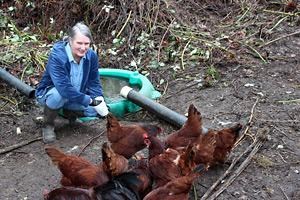With a hint of spring in the air, many Powell River residents are making plans for their gardens and yards. Some are planning on adding chickens to their backyards, after City of Powell River council adopted amendments to the animal control bylaw in December. Residents may now keep up to three poultry on any size lot. Properties of half an acre and larger are permitted more poultry, rabbits and larger livestock.
The bylaw defines poultry as domestic fowl, or hens, ducks, geese, turkeys, pigeons or similar birds. However, no roosters are allowed.
Wendy Devlin is a member of the Powell River Farmers’ Institute’s urban livestock committee. She pointed out that chickens are good for providing eggs or as meat birds. They also use up compost, eat bugs and provide fertilizer for the garden.
Hybrid birds will lay eggs for about two years, then slow down by year three, Devlin explained. Heritage birds take longer to get into good egg production, laying well at three, four and five years. After chickens stop laying, they can be used as meat and are commonly called stewing hens at that point, because they make delicious soups.
The city’s bylaw is quite generous, Devlin said, and she encourages anyone who is interested in raising chickens in their yards to read it first. The next step is to talk to neighbours.
The bylaw states that anyone keeping poultry has to have appropriate enclosures, which provide adequate weather protection, prevent the poultry from wandering into neighbouring properties and provide protection from natural predators. They must be located within the rear yard of the property and be not less than 0.9 metres from a property line.
“You need to clean your coop and enclosures frequently to prevent smells and attracting other animals like raccoons, bears and rats,” Devlin said. “Poultry also need adequate fresh water and food available at all times.”
People need to keep their chickens safe, Devlin said, because “everything likes chickens. Farmers know that chickens are at risk not only from predators, such as bears and raccoons, but also birds of prey, like eagles and hawks.”
Having chickens is a commitment, because it takes time to care for them properly. “If people are going to have chickens, they’re going to have to be good to them,” Devlin said. “If people do it casually or irresponsibly, the chickens will be gone. They’ll get sick or be eaten.”
The Powell River branch of the SPCA opposed the bylaw amendment, because the organization was concerned about the health and well-being of the poultry. The farmers’ institute committed to being a resource and taking responsibility for diseased or old birds or problem situations. “We’re hoping as an institute that more people will take up farming,” Devlin said. “That’s why we’re involved.”
As it is, the institute is concerned about the welfare of the animals, Devlin added. “There is a learning curve, but we’re hoping that people will enjoy it and enjoy the eggs or the meat.”
Devlin is giving a workshop on urban poultry during Seedy Saturday, which this year takes place on Saturday, March 9 at Powell River Recreation Complex. As well, the farmers’ institute will have an urban chicken display at the event that will give residents an idea of what is involved in keeping chickens and information about how to get started. Mother Nature has donated a proper chicken coop for three hens that will be part of the display. The coop will also be raffled off, with half of the proceeds going to the farmers’ institute.
A Career Link youth employment initiative, called Hens in the Hood, ran a pilot project in 2010, which included nine sites, all on small properties. Four hens were kept on each site. There were no reported problems during the project, including no conflicts with bears.
Youth participants built chicken coops and the design of the structure is available by calling Rob Hughes at Career Link, 604.485.7958.
The farmers’ institute’s website, has extensive information and links to other websites to help people get started raising chickens and enjoy the experience.



